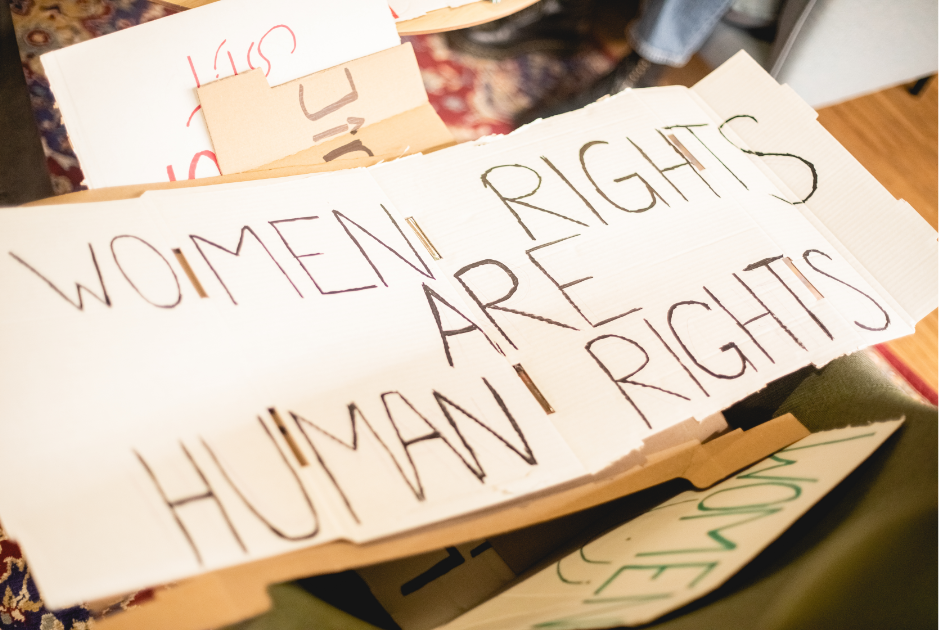You can have a life after surviving sex trafficking. Here's how it starts.
When someone is first escaping sex trafficking, it can feel difficult and overwhelming to imagine what's waiting on the other side.
This is especially true for children and minor youth, who make up a sizable percentage of those who are exploited in the United States. While the exact number is not known because many instances of exploitation go unreported, the National Human Trafficking Hotline and BeFree Textline report that roughly 25% of the calls they receive are from minors.
Some have never known life outside their abuse, so picturing a different life can feel impossible. But, no matter how hard it can feel at first, the other side of surviving sex trafficking is more than worth the journey it takes to get there. Because there is always hope and people that are there to help you along the journey — and no one knows this better than the survivor-leaders who've gone on to help other survivors find their strength again.
All photos by iStock unless otherwise noted.
One such leader is Dr. Karen Countryman-Roswurm, founder and executive director at the Center for Combating Human Trafficking (CCHT) at Wichita State University.
Today, she considers herself a “survivor of the systems and the streets." She has been doing anti-trafficking work locally, nationally, and internationally for 23 years.
"My personal experiences led me to this work," she says.
She was hired to do street outreach for the same shelter she once stayed at, and that helped her come to terms with what had happened to her. And because Karen had been in the system, she knew what needed to change — like talking to survivors about what they'd gone through.
"Nobody ever asked me the question, 'what happened to you while you were on the streets?,'" she says.
[rebelmouse-image 19397893 dam="1" original_size="700x467" caption="Photo by Flo Karr/Unsplash." expand=1]Photo by Flo Karr/Unsplash.
She also knew that if anyone could help facilitate that change, it was a survivor like her. So that's exactly what she set out to do.
Today, she's an inspiring leader in the anti-trafficking movement who uses her personal and professional expertise to improve services for survivors of trafficking. Karen has not only worked directly with survivors, but has also conducted decades of research on what helps people overcome experiences like abuse and exploitation. She also has a PhD in psychology — another attribute that makes her instrumental in the fight against exploitation.
Karen's developed services and programs to help survivors reclaim their lives, but she stresses that it starts with "creating a space that allows them to become more than just [their] experience."
After all, they're much more than survivors of exploitation.
Karen explains that "there's a context that created the scenario of exploitation, and that's really what you've overcome."
Finding others to talk to about the trauma you've experienced is integral to overcoming it, and eventually thriving afterwards. A supportive group of people who understand what you've been through is often the safest place to work through feelings, and eventually find some peace. It can also be helpful if you're still dealing with exploitation, and not sure how to find a way out.
[rebelmouse-image 19397894 dam="1" original_size="700x467" caption="Photo by Omar Lopez/Unsplash." expand=1]Photo by Omar Lopez/Unsplash.
Through weekly survivor meetings, mentorship, counseling, and support networks, CCHT strives to give survivors the tools they need to heal. These tools can be especially helpful for survivor youths who may need more help finding a supportive community.
Karen notes that this comes down to forming a "transformational relationship" with someone who can help a survivor "move past their need for a system, so they have support when they need it, but can [also] exist well on their own."
It's also important to remember that it takes time and lots of self-care to go from a recent survivor to being a survivor leader like Karen. Just ask Judge Robert Lung.
Robert is a District Court Judge appointed by the governor of Colorado, an appointee to the United States' Advisory Council of Human Trafficking, and a consultant for the Department of Justice Office for Victims of Crime, just to name a few of his credits.
But, while he's a well-known anti-trafficking advocate today, it took Robert, who is also a survivor of exploitation, decades to get to a place where he felt comfortable speaking publicly about his own experience.
Photo via iStock.
"I got involved when I'd had enough recovery that I could engage in that kind of work," he explains.
For Robert, that involved decades and stages of self-care.
“It's always about self-care. Being aware of your needs and meeting those needs as best you can," he continues.
Self-care is an essential part of recovery for anyone who's experienced trauma. For young people, it might mean seeing a licensed therapist or sharing feelings with a trusted friend or loved one. Or it might mean doing something as simple as spending a few minutes a day breathing in and out deliberately (inhale for three counts, hold your breath for three counts, then exhale for three counts, working your way up to eight counts). If you're not sure what to try, these easy grounding exercises are a great place to start.
You don't have to be in an active crisis to do these self-reflective things — they're just practices that help remind you that you're in control of your body and mind. And they don't have to look any one way either. Whatever you choose to do, it's about refocusing healing energy onto yourself, and giving yourself the space and time to process where you're at emotionally.
[rebelmouse-image 19397896 dam="1" original_size="700x394" caption="Photo by Ben Blennerhassett/Unsplash." expand=1]Photo by Ben Blennerhassett/Unsplash.
It's also important to allow your self-care routines to change over time, depending on what kind of support you need.
For example, Robert started going to therapy in his mid 20s, and eventually tried eastern medicine like reiki and acupuncture because as his recovery evolved, so did his treatments. He realizes they may always be a part of his life in some way, and that's OK.
"It's a process, not a destination," he notes.
Both Karen and Robert agree that becoming a survivor-leader is incredibly empowering, but rushing into that work can do more harm than good.
[rebelmouse-image 19397897 dam="1" original_size="700x467" caption="Photo by Daniel McCullough/Unsplash." expand=1]Photo by Daniel McCullough/Unsplash.
"The moment after you realize you're a victim — that's not the time to start doing advocacy work," says Robert.
It's important to focus on yourself and your own needs first. If you haven't fully dealt with your trauma, sharing it could negatively impact your recovery.
That said, once you truly feel ready, advocacy work can help you thrive while simultaneously helping other survivors realize they're not alone.
[rebelmouse-image 19397898 dam="1" original_size="700x467" caption="Photo by Justin Groeb/Unsplash." expand=1]Photo by Justin Groeb/Unsplash.
Robert is a prime example of this. More often than not, when trafficking stories are reported by the media, they're focused on girls and women, which can in turn cause male victims to feel isolated. However, male victims are usually vulnerable to trafficking for the same reasons as females: history of physical or sexual abuse and/or lack of family support. Thankfully, advocates like Robert are working to shed light on the male stories of sexual exploitation.
Survivor-leaders are an essential part of survivor support systems, but they're not the only ones you can turn to for help. Sometimes talking to a trusted loved one is the best first step towards recovery.
Photo via iStock.
It likely won't be an easy conversation, but sharing your experience with someone who cares about you may help give you the strength you need to move forward.
It's so important to have a touchstone like that in your life — someone with whom you can feel completely safe and supported.
With that in mind, if you're not a survivor, but you suspect someone you know is being exploited, the best thing you can do is let them know you're there for them, and there is a way out.
"There is hope in a life waiting for you that will allow you to step into your true identity," says Karen.
And for anyone who's currently experiencing exploitation, please remember, there are people in your community who will stand by you in your journey leaving abuse, even if you don't know them yet.
Life extends beyond trauma — you just may need a little help getting there.
Learn more about community resources that can help you or others overcome exploitation or sex traffickinghere.





 What was I doing again?
What was I doing again? A space waitress at work.
A space waitress at work.  Waking Up Funeral GIF
Waking Up Funeral GIF Rihanna Nails GIF
Rihanna Nails GIF Yoga pants.Image via Canva.
Yoga pants.Image via Canva. Our natural lashes are nice just the way they are!
Our natural lashes are nice just the way they are! One step forward, many steps back. Image via Canva.
One step forward, many steps back. Image via Canva.  Homelessness is especially rampant on the West Coast.Image via Canva
Homelessness is especially rampant on the West Coast.Image via Canva